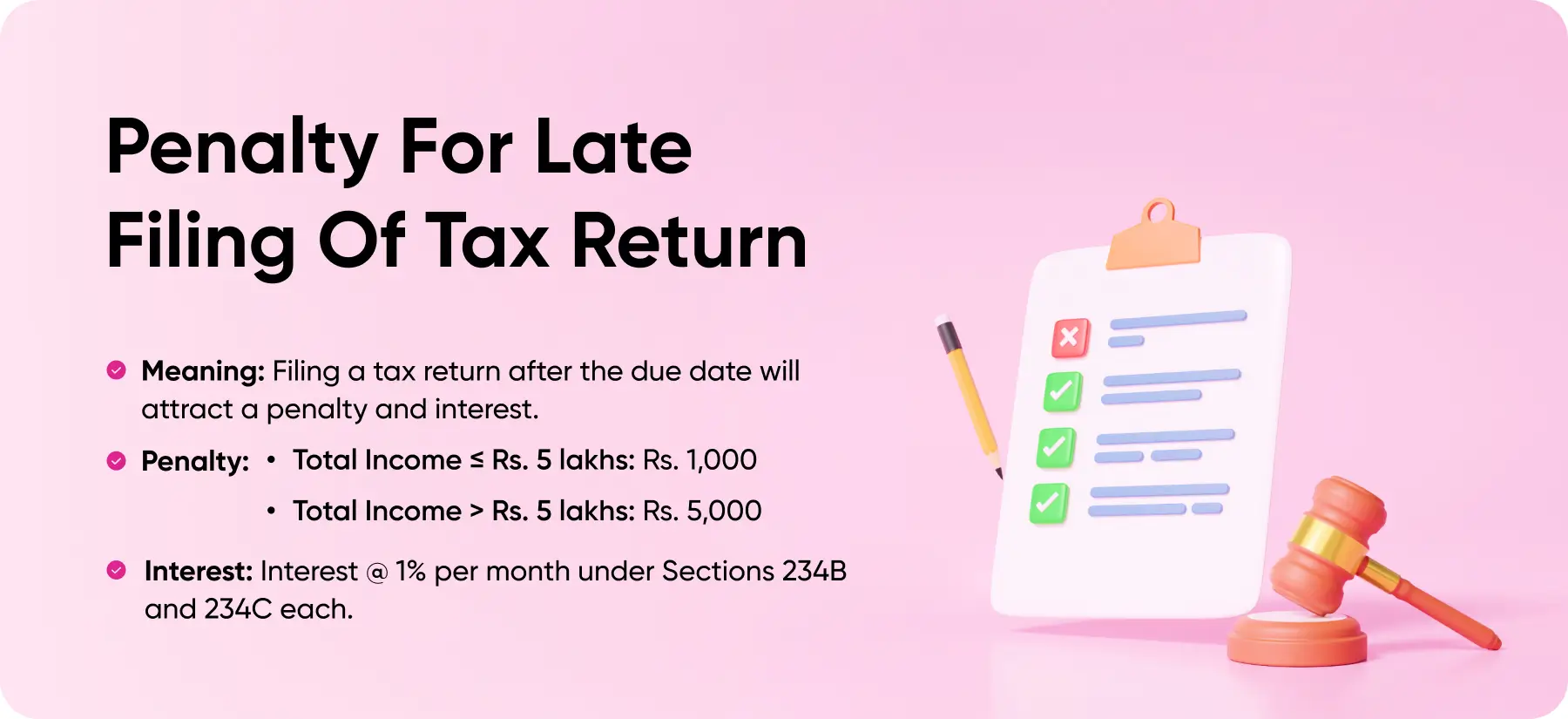Penalty for Late Filing of Income Tax Return for FY 2024-25 – Section 234F of Income Tax Act
The last date to file your Income Tax Return (ITR) for FY 2024-25 (AY 2025-26) is 16th September 2025 for individual taxpayers. Failing to file your ITR on time can not only attract a penalty but also lead to other consequences and inconveniences, such as loss of certain deductions, delayed refunds, and issues in visa processing or loan approvals.
What is the Penalty for Late Filing of ITR?
Under Section 234F of the Income Tax Act, if you file your ITR after the due date, you may have to pay a maximum penalty of Rs. 5,000
For FY 2024-25, if you file your return before 16th September 2025 (due date extended to 10th December 2025 for audit cases), no penalty is levied. However, returns filed after 16th September 2025 will attract a penalty of up to Rs. 5,000. As a relief to small taxpayers, if your total income does not exceed Rs. 5 lakh, the penalty for late filing is restricted to Rs. 1,000 only. Please note that section 234F is a fee for late filing, not interest.
Late Filing Fee Details
The late filing fees when the return of income is filed beyond the due date is explained below.
| Annual Taxable Income | Late Filing Fees u/s 234F |
| Up to Rs. 5 lakhs | Rs 1,000 |
| More than Rs 5 lakhs | Rs 5,000 |
Note: No late fee needs to be paid as long as the returns are filed within the due date (16th September for FY 2024-25)
Due Date for Revising Your Return
If you make a mistake while filing your ITR, you can still revise the return within 31st December of the assessment year. For example, for the financial year FY 2024-25, the assessment year is FY 2025-26. Revised return for AY 2025-26 can be filed until 31st December 2025.
This effectively means you have 9 months from the end of the financial year to correct any errors. Therefore, filing your ITR early ensures you have a longer window to make any necessary corrections before the deadline.
Payment of Interest for Late Filing under Section 234A
If you fail to file your income tax return on or before the due date, you will be liable to pay interest at 1% per month or part of a month on the unpaid tax amount, as per Section 234A of the Income Tax Act. It is important to note that your ITR cannot be filed without payment of the due taxes. The calculation of interest begins immediately after the due date, which for FY 2024-25 (AY 2025-26) is 16th September 2025. Therefore, the longer you delay filing, the higher your interest liability will be.
Carry Forward of Losses is Not Permitted if ITR is Filed Late
If you have incurred losses during the financial year, such as capital losses or business losses, it is crucial to file your income tax return within the due date. Filing your return after the deadline will disqualify you from carrying forward these losses to offset against future income, leading to higher tax liability in subsequent years. However, there is an exception for losses under the head ‘Income from House Property’, which can still be carried forward even if the return is filed after the due date. Unabsorbed depreciation from the businesses can also be carried forwarded even if the returns are not filed within the due date.
No Option to Opt for Old Tax Regime if ITR is Filed Late
If you file your ITR after the due date, you will be mandatorily taxed under the New Tax Regime. In such cases, taxpayers cannot choose the Old Tax Regime, which means that if you have significant deductions or exemptions to claim, you will lose out on these benefits and your tax liability may be higher under the new tax regime.
Delay in Receiving Refunds
If you are entitled to a tax refund for excess taxes paid, it is important to file your ITR before the due date to ensure that you receive your refund without delays. Filing your return late can significantly postpone the processing of your refund.
Other Consequences of Filing Return in Delay
Apart from consequences from taxation perspective, there are several other factors that may be adversely affected when returns are not filed within the due date. Non filing returns on time may result in adversities in loan sanction process, VISA processing, and lower financial discipline and credit worthiness. Therefore, it is advised to file the returns well before the due date and avoid the negative consequences of delays.
Related Articles
1. Reasons for delay in refund
2. ITR Filing Due Date 2025
3. Belated Return Under Section 139(4)
4. Updated Return Under Section 139(8A)
5. Can I File ITR for Last 3 Years

